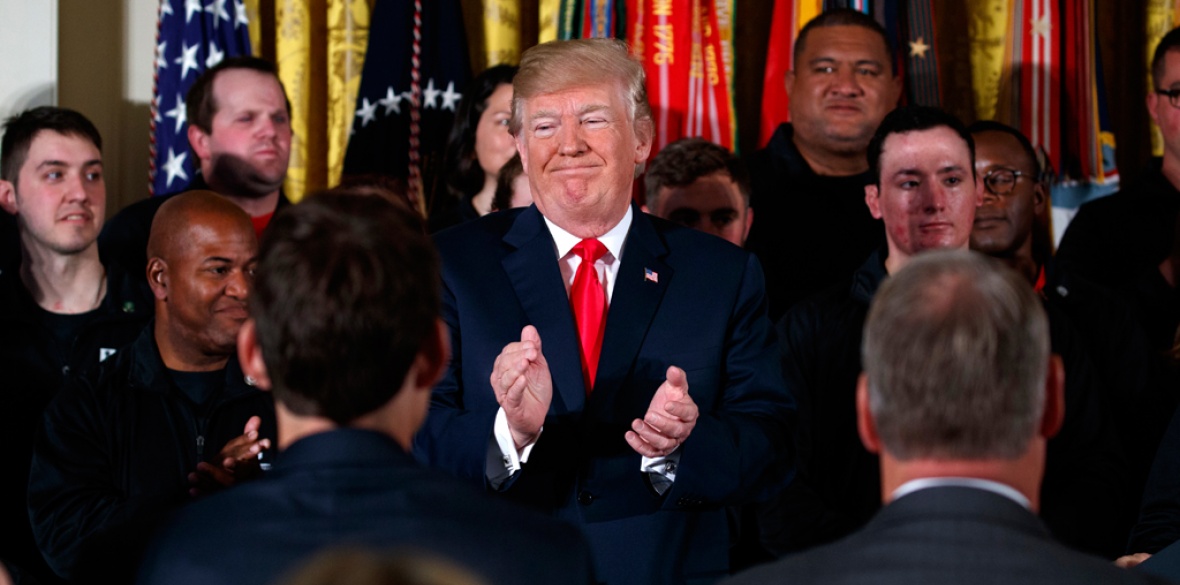This is the last article you can read this month
You can read more article this month
You can read more articles this month
Sorry your limit is up for this month
Reset on:
Please help support the Morning Star by subscribing here
THE decision of US President Donald Trump to quit the UN Human Rights Council (UNHRC) this week has hardly contributed to improving his image as someone who cares about these questions.
His ambassador to the UN, Nikki Haley, has described the UNHRC as “a cesspool of political bias.”
Haley has form for abusive and confrontational behaviour in the UN, defending Israel to the hilt and using every opportunity to attack those the US deems its enemies, from Iran to Venezuela.
The issue of division here is however the UNHRC attitude to Israel, as the body has the temerity to regard Israel’s treatment of the Palestinians as of concern and has regular reviews of its actions.
This is highly inconvenient to Trump who has nailed his colours to Israeli Prime Minister Benjamin Netanyahu’s mast with his decisions to tear up the nuclear deal with Iran and to move the US embassy to Jerusalem.
The mismatch between the US view of the council and that of most other countries is one which has proved too much for Trump, hence his decision.
Even Britain, which is usually so keen to cement its special relationship with the US, has had to make clear that it is not going to follow the same route, just as it has had to do over Iran and the Jerusalem embassy.
And, for sure, there are plenty of criticisms of double standards that can be raised about some of the other countries that are on the council, which also have dubious records on human rights, including Saudi Arabia, China, Hungary and Ukraine.
But it seems that we can be confident that lack of human rights elsewhere is not the main concern of the Trump administration.
Rather it is to make clear US continuing support for Israel, while also declaring that it will not be tied to any international agreements or bodies that might in some way limit its actions.
The news this week has amply demonstrated why. World opinion has recoiled in horror at the sight of children of refugees and migrants taken from their parents and held in camps, to their obvious distress.
The actions of the US border guards are reminiscent of some of the most barbaric treatment of children, are illegal and are a breach of their human rights.
The level of opposition has forced Trump to back off slightly, but not very much. He still demands the imprisonment of whole families caught at the border — families escaping war, violence, poverty and who are so desperate that they risk the sort of treatment being meted out to them.
Trump has responded to political criticism by denouncing hypocrisy — citing for example Theresa May’s “hostile environment” to migrants here.
We could also point to the barbaric treatment of refugees in the Mediterranean, the drowning and other deaths that are regular occurrences, the camps in Turkey, Libya and elsewhere which house refugees unable to breach “Fortress Europe.”
These are all appalling breaches of human rights that the UN and its agencies have done little to prevent.
But we cannot accept a race to the bottom over these issues, especially over human rights.
Politicians in the developed world are engaged in a bidding war to be tough on migrants and refugees which has created hell on earth for many people in the richest countries in the world.
They are prepared to sanction behaviour and events which help create refugees — most notably the wars which have spread from Afghanistan to Mali over the past two decades — but they refuse to accept any responsibility for those who want to come to the countries which have waged these wars.
It is perhaps the greatest irony that these wars have been fought in the name of “western values” — human rights, democracy and freedom — but their consequences have been some of the worst denials of human rights and freedoms seen since the second world war.
Trump wants to continue on that path and gives comfort to those far-right politicians who are using scapegoating of migrants and Muslims to build their support.
In Italy, Austria, Hungary and Denmark to name a few, we are seeing the impact of overtly racist policies that lead to registering of the Roma population in Italy or refusal to land ships carrying refugees.
Trump’s quitting of the UNHRC is one sign of his wilful attempts to move society to the right, to make the most racist ideas respectable and to scapegoat those who dare to challenge his agenda.
His policies are leading to more war in the Middle East. The escalation of war in Yemen has the full backing of Trump and of the British government.
The deliberate support for Israeli policies, including the escalation with Iran and the spread of illegal settlements, also makes war more likely.
Trump has, however, received a major setback this week and we must build on it.
There is growing opposition to his visit here next month and we should demand that Theresa May cancels his visit now.
We know that there are many tens of thousands who will be protesting on July 13 if and when he comes to Britain.
There are many reasons to protest against Trump, but not a single demonstrator will forget the images of his state sanctioned child abuse.
If governments cannot protect human rights, then working people have to do so.
Lindsey German is convenor of the Stop the War Coalition.










